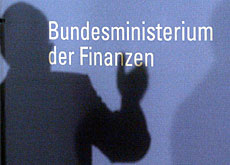German government paves way for tax amnesty

Germany has approved plans for a tax amnesty in a bid to repatriate billions of euros invested abroad, much of which is deposited in Swiss banks.
German citizens are estimated to have about €300 billion in banks abroad, about €100 billion of which is held in Switzerland.
Swiss banks are playing down the likely impact of the amnesty, details of which first appeared last year.
The country’s financial institutions weathered a similar amnesty in Italy – introduced in November 2001 – after many Italians repatriating funds simply transferred their money to branches of Swiss banks in Italy.
No comment
James Nason, a spokesman for the Swiss Bankers Association, declined to comment directly on the German government’s plans.
“We certainly would not have the impertinence to comment on or interfere with the taxation arrangements of a foreign sovereign state. Germany’s tax affairs are an issue for Germany and its citizens,” Nason told swissinfo.
“But tax evasion is not the reason behind the success and excellent reputation of the Swiss financial centre. Monetary, economic and social stability are crucial pulling factors,” he added.
However, Switzerland’s two largest banks, UBS and Credit Suisse, did see outflows of SFr15.2 billion and SFr3.3 billion respectively as a result of the Italian tax amnesty.
Nothing to fear?
Nason believes the country’s banks have little to fear from a similar amnesty in Germany.
“Some prophets of doom think the Swiss banking industry quivers with fright every time the words ‘tax amnesty’ are mentioned, but quite frankly we just yawn,” commented Nason.
Under the terms of the German proposal, investors will be able to avoid fines and prosecution by paying a 25 per cent tax on past interest earned from funds they return to Germany during 2004.
A higher tax rate of 35 per cent will apply between January 1 and March 31, 2005.
Some analysts believe the high tax on repatriated funds is likely to discourage many Germans from taking advantage of the amnesty.
The plan, which was approved by the German cabinet on Wednesday, now has to be passed by parliament.
The German chancellor, Gerhard Schröder, said in December he expected that about €100 billion would be brought home, leading to a windfall of €25 billion for the federal government, states and local communities.
swissinfo, Robert Brookes

In compliance with the JTI standards
More: SWI swissinfo.ch certified by the Journalism Trust Initiative


You can find an overview of ongoing debates with our journalists here . Please join us!
If you want to start a conversation about a topic raised in this article or want to report factual errors, email us at english@swissinfo.ch.